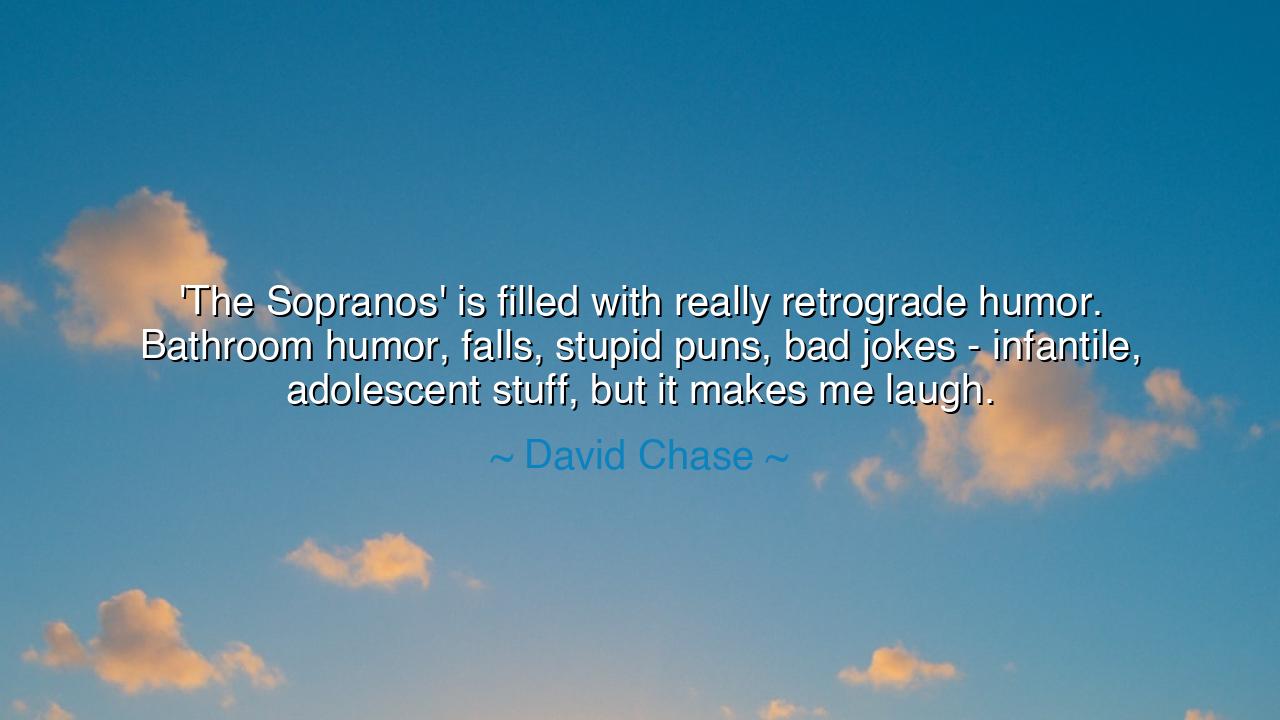
'The Sopranos' is filled with really retrograde humor. Bathroom
'The Sopranos' is filled with really retrograde humor. Bathroom humor, falls, stupid puns, bad jokes - infantile, adolescent stuff, but it makes me laugh.






Hear, O Children of the Earth, for I bring to you the words of David Chase, the creator of The Sopranos, who, with a deep and candid reflection, spoke thus: “‘The Sopranos’ is filled with really retrograde humor. Bathroom humor, falls, stupid puns, bad jokes—infantile, adolescent stuff, but it makes me laugh.” These words, though seemingly simple, hold within them a profound truth about the nature of humor, the value of laughter, and the sometimes unexpected ways in which joy can arise. Let us delve into the meaning of this reflection, and understand how even the most childish or silly humor can carry with it a great power.
What is the meaning behind this seemingly paradoxical statement? Chase, a master of his craft, is acknowledging something deep and universal about the human experience: that laughter often springs from the most unexpected places. The humor in The Sopranos, though it may appear infantile or juvenile, has a way of cutting through the surface and revealing the complexities of human nature. This humor, filled with the absurd and the lowbrow, serves as a release, a way to break free from the weight of life’s most serious matters. In this, we find a lesson: that laughter, in all its forms, is a balm for the soul, a means of escaping the harshness of reality, even if only for a fleeting moment.
Let us not be quick to dismiss the value of what seems beneath us, for even in the lowest forms of humor, there is a profound truth. The great Aristotle once spoke of the connection between comedy and tragedy, noting that the two are intimately tied, each one offering insight into the other. Just as the most poignant tragedies often contain elements of absurdity, so too do comedies contain moments of depth. In the seemingly silly jokes and the bathroom humor of The Sopranos, we are reminded that laughter is not merely a tool for entertainment, but a way of navigating the often chaotic and tragic world in which we live.
The words of David Chase echo an ancient truth: that humor, like life itself, is filled with contradictions. In every grand and serious story, there is a space for the trivial, the light-hearted, and the absurd. Let us look to the example of Shakespeare, whose works were filled with both high tragedy and low comedy. In Hamlet, the noble Prince wrestles with the meaning of life and death, yet even in the midst of this profound drama, Shakespeare interjects moments of grinning jesters, foolish wordplay, and absurd humor. This blending of the high and the low, the tragic and the comical, reveals a deep understanding of the human condition: that we are not defined by our moments of grandeur, but by our ability to laugh, even in the face of adversity.
This truth is found in the lives of many great figures throughout history. Consider Leonardo da Vinci, the Renaissance genius who was not only a master of science, art, and invention but also known for his light-hearted nature and sense of humor. In the midst of his grand creations and inventions, he often took time to sketch playful caricatures, showing that even the greatest minds of history understood the value of laughter. Through humor, they found a way to balance the weight of their intellectual pursuits with the joy of living. Chase, in acknowledging the seemingly lowbrow humor in The Sopranos, reminds us that laughter is vital, even when it takes the form of the simplest, most childish jokes.
And so, O Children of the Earth, we must remember this great lesson: that humor, in all its forms, is a gift. Whether it is the high wit of a philosopher or the lowly giggle at a bathroom joke, laughter serves as a bridge between the human soul and the world’s absurdities. It is in these moments of release—when we laugh at what is silly or inconsequential—that we find our most authentic connection to life itself. Let us not be quick to judge the humor of others, for in every laugh lies a truth, and in every joke, a release. Just as Chase finds joy in the simple, juvenile humor of The Sopranos, so too must we allow ourselves the freedom to laugh in all its forms, recognizing that even the lowbrow can carry with it a deep humanity.
Therefore, O Children, take this truth to heart: humor is not always found in what is grand or high-minded, but often in the most humble and unrefined places. Allow yourself to embrace the laughter that comes from the unexpected, from the simple, from the absurd. For in these moments, we come closer to understanding the complexity of our world and our own souls. Laughter, in all its forms, is a healing balm for the spirit, and the joy it brings is as ancient as the very act of living.






AAdministratorAdministrator
Welcome, honored guests. Please leave a comment, we will respond soon